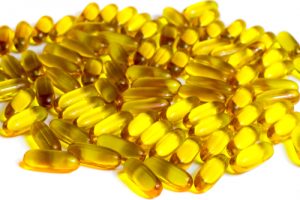Video Link: https://vimeo.com/289145234
Video Download: Click Here To Download Video
Video Stream: Click Here To Stream Video
 Vitamin A is not just one nutrient, but a class of nutrients which all fill the same necessary range of needs for the human body.
Vitamin A is not just one nutrient, but a class of nutrients which all fill the same necessary range of needs for the human body.
The most commonly known source of Vitamin A is Beta-Carotene, but others include Retinoic Acid, Retinal, and Retinol. Vitamin A is not only a crucial Antioxidant, but it also facilitates normal and healthy functions in a range of other ways.
For example, Vitamin A is critical for eye development and eye health, because it is a component of Rhodopsin, which is necessary for the eyes to absorb light properly.
Beyond vision, Vitamin A is highly influential in the normalized function of other organs and systems, such as the kidneys, lungs, and heart.
Types of Vitamin A—Preformed Vitamin A and Provitamin A
Though there are many subclasses of Vitamin A, they can all be divided into two groups—Preformed and Provitamin A. Preformed Vitamin A is found solely in products of animal origin, such as meat, fish, and dairy.
Provitamin A is found in plant pigments, and the three most common forms of Provitamin A are Beta-Cryptoxanthin, Alpha-Carotene, and the famous Beta-Carotene. The body absorbs both types of Vitamin A and converts it into Retinoic Acid and Retinal.
Five Reasons You Should Make Sure You Get Your Vitamin A
Vitamin A Preserves Vision and Eye Function
Macular Degeneration is a significant risk as men and women get older, and is  exacerbated by Vitamin A Deficiency.
exacerbated by Vitamin A Deficiency.
One study found that a supplemental cocktail which included Vitamin A and other essential nutrients reduced the chances of Macular Degeneration for ¼ of patients over the course of 6 years.
Furthermore, eye drop formulations of Vitamin A have proven useful for patients with chronic dry eyes.
Vitamin A Boosts Immune Function
 Vitamin A is essential for a range of immune system tasks, and Vitamin A supplementation has been shown to bolster the immune response.
Vitamin A is essential for a range of immune system tasks, and Vitamin A supplementation has been shown to bolster the immune response.
Not only does Vitamin A assist in the body's fight against significant conditions such as autoimmune disorders and cancer, but it also helps against common viruses and bacterial infections. In poorer countries, Vitamin A Deficiency in children is strongly associated with increased childhood mortality risk.
Vitamin A Protects Against Inflammation
Getting your daily recommended allowance of Antioxidants is essential. Your  body uses Antioxidants to protect against the negative impact of Free Radicals, which damage DNA and contribute to general physiological wear and tear.
body uses Antioxidants to protect against the negative impact of Free Radicals, which damage DNA and contribute to general physiological wear and tear.
Vitamin A keeps inflammation in check and can even protect against the development of food allergies, especially in children.
Inflammation is powerfully associated with the development of many neurological diseases, including Alzheimer's and Parkinson's. By controlling inflammation, it may be possible to reduce your risk of such conditions.
Vitamin A Promotes Healthy Skin
In addition to its effects on immune health, Vitamin A also contributes heavily to healing processes, most notably the healing of skin wounds and soft tissue. This is because Vitamin A is a critical component of the process of Glycoprotein formation, which is essential to the foundation of such tissue.
Individuals that don't get enough Vitamin A are more likely to deal with premature skin aging, poor complexion, acne, and other issues associated with reduced skin health.
Also, Vitamin A is a common ingredient in shampoos because many of the same benefits that apply to the skin also apply to hair.
Vitamin A is a Crucial Component of Cancer Treatment and Prevention
 In the 21st century, Cancer Research is advancing at a rapid pace.
In the 21st century, Cancer Research is advancing at a rapid pace.
We are quickly learning new methods to treat existing cancers and to reduce the risk of cancer in the future.
Recent research published by representatives from the University of York shows that Vitamin A has a critical role to play in preventing the proliferation of cancer cells. As you may know, human cells malfunction every day, and the vast majority of the time, cancer does not develop. The human body has various processes to prevent the growth of tumors from malfunctioning cells.
Retinoic Acid, the body's activated form of Vitamin A, appears to suppress the malignancy of various cancers, including skin, breast, prostate, and lung cancer.
At this time, we don't fully understand why Vitamin A has these effects, but it is clear that Vitamin A is highly beneficial in this regard.
It's important to recognize that Vitamin A overdose is dangerous to healthy cells, so at this time, only Vitamin A Supplementation is recommended as a means to reduce the risk and proliferation of cancer.
How Much Vitamin A Should I Get Each Day?
Vitamin A belongs to the broad class of Fat-Soluble Vitamins. Unlike Water-Soluble vitamins, which pass excess vitamins through the kidneys, Fat-Soluble Vitamins accumulate in adipose tissue, which means that there is a risk of overdose if one intakes too much Vitamin A too frequently.
Suggested guidelines suggest that adult males get at least 900 mcg per day, while adult females get 700 mcg per day, though this increases to 1200 mcg daily during breastfeeding. Children, dependent upon age, require between 300-600 mcg daily, rising from age one to age thirteen.
While sufficient Vitamin A supplementation helps the human body thrive, too much can be detrimental to health. The National Academy of Scientists recommends getting no more than 3,000 mcg of Vitamin A Daily. 3,000 mcg Vitamin A is Equivalent to 10,000 IU of the nutrient.
Sources of Vitamin A
As we mentioned, Vitamin A can be sourced from both plant products and animal products. If you are looking for an efficient means to get your daily dose of Vitamin A, the following are some of the most potent sources of the crucial Vitamin, all of which provide at least 40% of your daily recommended intake:
- Tuna
- Cantaloupe
- Spinach
- Romaine Lettuce
- Red Pepper
- Kale
- Beef Liver
- Sweet Potato
- Carrots
Contact Us Today For A Free Consultation

- Testosterone for Women [Last Updated On: December 1st, 2023] [Originally Added On: December 29th, 2013]
- Testosterone Androgen [Last Updated On: December 11th, 2023] [Originally Added On: December 29th, 2013]
- Testosterone and Body Building [Last Updated On: December 14th, 2023] [Originally Added On: December 30th, 2013]
- Testosterone Levels [Last Updated On: December 6th, 2023] [Originally Added On: December 31st, 2013]
- Testosterone Gel, Cream, and the Testosterone Patch [Last Updated On: November 28th, 2023] [Originally Added On: December 31st, 2013]
- Buy Testosterone | Types of Testosterone Replacement Therapy Programs, Injections, Cream and Gel [Last Updated On: December 13th, 2023] [Originally Added On: December 31st, 2013]
- Buy Testosterone Injections Online, Testosterone Prescription for Low T, Testosterone Replacement Therapy [Last Updated On: October 16th, 2020] [Originally Added On: January 1st, 2014]
- Aging and Testosterone Replacement Therapy [Last Updated On: December 12th, 2023] [Originally Added On: January 3rd, 2014]
- What Causes Low Testosterone [Last Updated On: December 10th, 2023] [Originally Added On: January 7th, 2014]
- Hormone Levels in Men [Last Updated On: December 4th, 2023] [Originally Added On: January 12th, 2014]
- Hormone Level Testing [Last Updated On: November 29th, 2023] [Originally Added On: January 13th, 2014]
- Types of Testosterone Products and Delivery [Last Updated On: December 8th, 2023] [Originally Added On: January 22nd, 2014]
- Testosterone Therapy Helps Men with Low-T Ward Off Prostate Cancer [Last Updated On: May 29th, 2024] [Originally Added On: December 29th, 2019]
- The Importance of Dietary Fat for Testosterone Production [Last Updated On: July 8th, 2024] [Originally Added On: January 2nd, 2020]
- Testosterone Deficiency and Low-T at Epidemic Levels Among Men in the United States [Last Updated On: May 27th, 2024] [Originally Added On: May 17th, 2020]
- The Effects of Testosterone Therapy on Male Patients -- Who Should Use Testosterone? [Last Updated On: December 20th, 2023] [Originally Added On: June 16th, 2020]
- Does Ibuprofen Contribute to Low Testosterone? [Last Updated On: January 27th, 2024] [Originally Added On: June 20th, 2020]
- The Link Between Testosterone and Lower Rates of Autoimmune Diseases Among Men [Last Updated On: January 30th, 2024] [Originally Added On: June 21st, 2020]
- Weight Cycling and the Problem with Crash Dieting [Last Updated On: April 8th, 2024] [Originally Added On: July 30th, 2020]
- Reexamining Bio-Identical Testosterone Therapy [Last Updated On: June 18th, 2024] [Originally Added On: August 12th, 2020]
- Understanding how Muscle and Fat Impact Body Mass, Weight, and Health [Last Updated On: April 15th, 2024] [Originally Added On: August 25th, 2020]
- The Role of Nitric Oxide in Cancer Proliferation And Prevention [Last Updated On: May 3rd, 2024] [Originally Added On: August 26th, 2020]
- Understanding Heartburn in the 21st Century [Last Updated On: April 24th, 2024] [Originally Added On: August 28th, 2020]
- What is Erectile Dysfunction? [Last Updated On: April 20th, 2024] [Originally Added On: August 30th, 2020]
- Sermorelin Acetate Drug Information [Last Updated On: April 7th, 2024] [Originally Added On: August 31st, 2020]
- Exercise and Mental Health [Last Updated On: April 5th, 2024] [Originally Added On: September 1st, 2020]
- The Importance of Proteins, Carbs, and Fats [Last Updated On: March 11th, 2024] [Originally Added On: September 2nd, 2020]
- Low-T Treatment Before and After -- How Testosterone Therapy Improves Vitality [Last Updated On: April 9th, 2024] [Originally Added On: September 6th, 2020]
- Changes to LabCorp Guidelines for Low-T Diagnosis and How They Impact Your Treatment [Last Updated On: July 14th, 2024] [Originally Added On: September 22nd, 2020]
- The Effects of Testosterone on Asthma Prevalence Among Men and Women [Last Updated On: February 19th, 2024] [Originally Added On: October 6th, 2020]
- 7 Exercises to Elevate Testosterone Levels [Last Updated On: June 13th, 2024] [Originally Added On: October 10th, 2020]
- Testosterone and Diet – How to Support Testosterone Levels with Healthy Eating [Last Updated On: June 7th, 2024] [Originally Added On: October 29th, 2020]
- The Significance of Telomeres in Stem Cell Treatments [Last Updated On: March 16th, 2024] [Originally Added On: November 27th, 2020]
- The Influence of Testosterone on Protective Mating Behaviors in Men [Last Updated On: January 25th, 2024] [Originally Added On: December 6th, 2020]
- The Role of Testosterone in Women's Health [Last Updated On: December 24th, 2023] [Originally Added On: December 7th, 2020]
- Testosterone Promotes Bone Health and Can Help Treat Osteoporosis [Last Updated On: February 15th, 2024] [Originally Added On: December 17th, 2020]
- The Relationship Between Testosterone and Cortisol [Last Updated On: April 2nd, 2024] [Originally Added On: December 19th, 2020]
- The Importance of Sex Hormone-Binding Globulin (SHBG) for Healthy Testosterone Levels [Last Updated On: March 9th, 2024] [Originally Added On: December 28th, 2020]
- 12 Health Issues That Can Kill Libido and Limit Sexual Performance [Last Updated On: May 23rd, 2024] [Originally Added On: January 3rd, 2021]
- 4 Foods to Boost Your Testosterone Levels [Last Updated On: February 7th, 2024] [Originally Added On: January 4th, 2021]
- Low Testosterone Symptoms [Last Updated On: December 31st, 2023] [Originally Added On: January 7th, 2021]
- Is Male Menopause Real? The Science of Andropause [Last Updated On: January 15th, 2024] [Originally Added On: January 11th, 2021]
- Relieve Fatigue and Increase Energy with Testosterone Replacement Therapy [Last Updated On: January 16th, 2024] [Originally Added On: January 16th, 2021]
- How to Administer a Testosterone Injection -- Low-T Injection Guide [Last Updated On: February 28th, 2024] [Originally Added On: January 17th, 2021]
- Testosterone Levels Associated with Serotonin Activity in the Brain [Last Updated On: March 26th, 2024] [Originally Added On: January 19th, 2021]
- Grumpy Old Man Syndrome – Causes and Treatments [Last Updated On: June 8th, 2024] [Originally Added On: January 22nd, 2021]
- The Effects of Beer on Testosterone Production and Gynecomastia [Last Updated On: March 21st, 2024] [Originally Added On: January 30th, 2021]
- Testosterone Frequently Asked Questions [Last Updated On: February 6th, 2024] [Originally Added On: February 26th, 2021]
- Testosterone Supplements: Vitamin and Amino Acid Pills Versus Real Testosterone [Last Updated On: November 21st, 2024] [Originally Added On: March 1st, 2021]
- Testosterone Side Effects, Risks, Dangers and Negative Effects [Last Updated On: November 7th, 2024] [Originally Added On: March 2nd, 2021]
- Testosterone for Men [Last Updated On: February 20th, 2024] [Originally Added On: April 13th, 2021]
- Testosterone Testing [Last Updated On: November 9th, 2024] [Originally Added On: May 7th, 2021]
- Hormone Replacement Therapy: Commonly Asked Questions [Last Updated On: February 20th, 2024] [Originally Added On: June 16th, 2023]
Word Count: 965




















